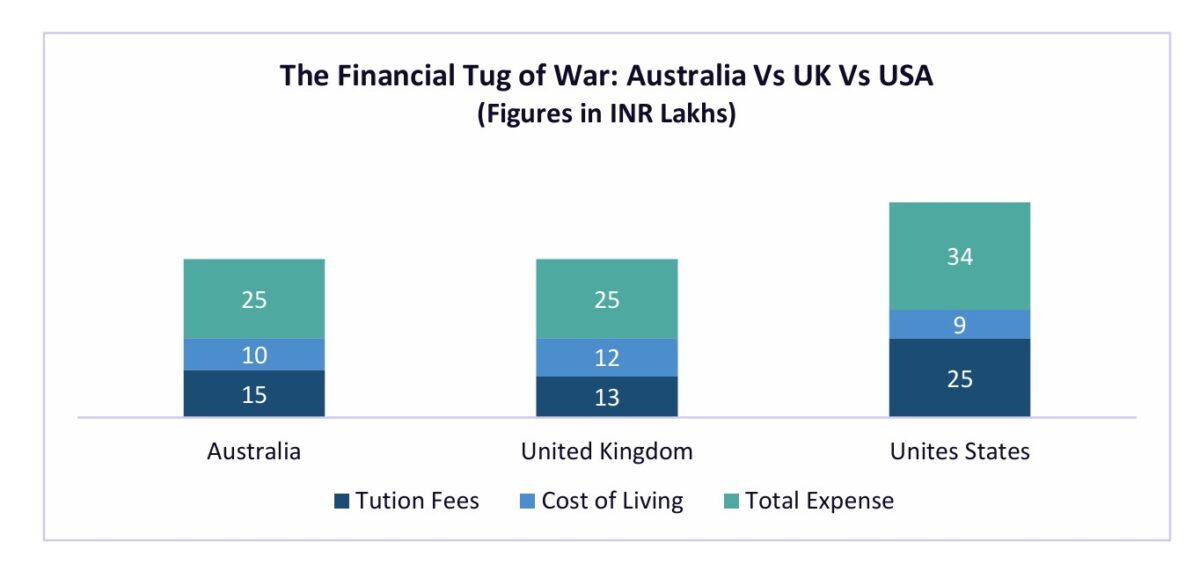Admissions Guide for Indian Students Looking to Pursue Overseas Education

Key considerations for students before pursuing Higher education abroad
Studying abroad can be a rewarding experience, but it requires careful planning and preparation. Here are some basic requirements and preparations for Indian students considering studying abroad:
- Research and Goal Setting: Identify the reasons for studying abroad, such as academic goals, career aspirations, or personal growth. Research countries and universities that align with your academic and personal objectives.
- Financial Planning: Evaluate the cost of living and tuition fees in the chosen destination. Explore scholarship opportunities and financial aid options. Plan a budget for living expenses, accommodation, and other related costs.
- Language Proficiency: Many universities require proficiency in the language of instruction (usually English). Take standardized language proficiency tests like IELTS, TOEFL, or others, if required.
- Academic Qualifications: Ensure that your academic qualifications meet the entry requirements of the chosen university or program.
- Get transcripts, recommendation letters, and other required documents in order.
- Standardized Tests: Depending on the program and country, you may need to take standardized tests such as the GRE, GMAT, SAT, or others.
- Visa Process: Understand the visa requirements of the destination country. Prepare and gather the necessary documents for the visa application.
- Cultural Awareness: Familiarize yourself with the cultural norms, customs, and etiquette of the destination country. Attend pre-departure orientation sessions if available.
- Networking and Support Systems: Connect with alumni or current students from your chosen university through social media or other platforms. Stay in touch with family and friends for emotional support.
- Prepare for Change: Be open-minded and ready to adapt to a new environment and culture. Learn about the local transportation system, laws, and emergency services.
- Health and Safety: Ensure you have necessary vaccinations and health check-ups before departure. Research emergency services and healthcare facilities available in the host country.
- Technology and Communication: Set up a reliable communication system to stay in touch with family and friends. Familiarize yourself with the technology and online platforms commonly used in the host country.
- Career Planning: Consider how studying abroad aligns with your long-term career goals. Explore internship or job opportunities available to international students.
By thoroughly researching, planning, and staying organized, you can make the process of studying abroad
smoother and increase the chances of a successful and enriching experience.
How to improve your chances for admissions abroad
For Indian students, starting their higher education journey overseas can be an exciting experience. Here are ten relatively straightforward strategies to turn your dream of studying in a foreign country into reality, accompanied by interesting facts and figures.
- Explore scholarship opportunities: Numerous countries extend scholarships to international students, providing substantial financial relief. UNESCO reports a global enrollment of over 5 million international students in 2019, with a significant portion benefiting from various scholarship programs.
- Consider Pathway programs: Pathway programs serve as a transitional bridge for students who might not meet the direct entry requirements of certain institutions. In recent years, over 50,000 international students entered the UK through pathway programs, showcasing the popularity and effectiveness of this approach.
- Look out for exchange programs: Many universities worldwide have established student exchange agreements, enabling students to experience a foreign education for a limited duration. Over the past decade, the participation of Indian students in exchange programs has witnessed a notable 50% increase.
- Research work-study opportunities: Several countries permit international students to engage in part-time work during their academic pursuits. Australia, for instance, allows students to work up to 20 hours per week during the academic semester, facilitating financial sustainability.
- Consider online degrees: The surge in online education has democratized access to courses globally, offering flexibility and convenience. The global enrollment in online courses experienced a remarkable 44% increase in 2020, underscoring the growing trend of virtual education.
- Look for universities with low entry requirements: Some universities have more lenient entry criteria for international students, easing the admission process. In Germany, universities with low or no tuition fees and simplified admission processes have gained popularity among students.
- Explore dual-degree programs: Dual-degree programs provide a unique opportunity to study in multiple countries and obtain degrees from both institutions. Currently, there are over 300,000 students globally enrolled in dual-degree programs, emphasizing the widespread appeal of this educational model.
- Leverage educational consultants: Educational consultants play a pivotal role in offering guidance on university selection and navigating the intricacies of the application process. The global educational consultancy market is poised to reach a substantial $26 billion by 2025, indicating the increasing demand for consultancy services.
- Participate in international competitions: Active participation and success in international competitions can significantly enhance opportunities for scholarships and admissions. The engagement of Indian students in prestigious global competitions, such as the International Science Olympiad, has witnessed a consistent upward trend.
- Utilize government initiatives: Governments often roll out initiatives to encourage international education, providing additional avenues for support. German Public Universities are run by the government and invite students across nationalities to study for free.
Managing stay & cost of living
The prospect of studying abroad is not just an academic journey; it’s an exhilarating adventure that opens doors to new cultures, perspectives, and lifelong memories. As an Indian student, choosing the right destination involves balancing your dreams with practical considerations, such as cost. Let’s unravel the mystery of the most expensive and surprisingly affordable countries for Indian students.
- The Goldilocks dilemma: Striking the Right Balance: Before we get into the details, let’s acknowledge the Goldilocks dilemma every student faces – finding the destination that’s just right in terms of budget. Studying abroad doesn’t have to be a financial burden; with careful planning, you can discover affordable gems that offer world-class education and unforgettable experiences.
- The pricey trio: USA, UK, Australia: In the illustrious halls of American education, tuition fees in public colleges can range from a whopping Rs 15 to 23 lakhs, while private colleges can stretch your budget to Rs 25-30 lakhs. Australia, not far behind, demands an average of Rs 15 lakhs for tuition, and the UK requires approximately Rs 13 lakhs. These numbers, coupled with living expenses, can easily make studying in these countries equivalent to the cost of a small house.

- Canada – Maple syrup and moderate expenses: Canada, with its friendly locals and stunning landscapes, strikes a balance between quality education and reasonable living costs. Tuition fees are relatively lower, and Canadian universities are renowned for their diversity and inclusivity. Keep an eye out for scholarships and part-time work opportunities to ease the financial load.
- The beacon of affordability – Germany: But wait, there’s a financial superhero in the study abroad universe, and its name is Germany. Picture this: No tuition fees in most public universities – a feat that doesn’t compromise on education quality. Instead, a mere Rs 40,000 per year as a social contribution fee. Cities like Munich and Berlin might pinch your wallet a bit more, with living costs around Rs 54,000 per month. Opt for a dorm, and you could save a few bucks, bringing it down to Rs 42,000 per month. In smaller cities, the cost of living takes a pleasant dip. With all these costs considered, the annual expense of studying in Germany might not exceed Rs 5-6 lakhs. Germany, the unsung hero of affordable education!


